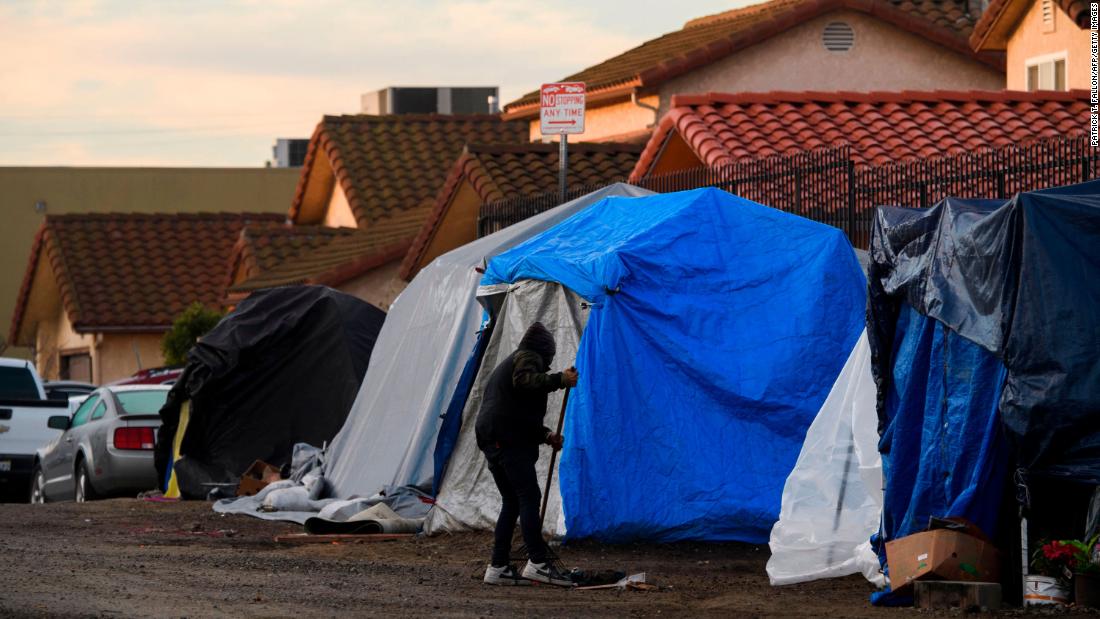
People experiencing homelessness are at risk of not receiving the latest payment at all.
It's not an eligibility issue. It's about access.
The full $1,400 payment should go to any individual who earns less than $75,000 of adjusted gross income, heads of households who earn less than $112,500, and married couples who earn less than $150,000.
But because the government uses tax information to identify and send payments, many unhoused people who don't file taxes because of their low income are left out.
Advocates and solutions for unhoused people can help them overcome barriers and receive their stimulus payments.
The biggest issue: Not filing taxes
Many unhoused people may not file tax returns because their income is too low to require it.
Last year, the IRS had a "non-filers tool" for people who didn't file taxes to claim their payments, but it has since been deactivated. Now, the only way for non-filers to get checks is to claim them as a rebate on their 2020 tax return.
The IRS recently announced that the tax deadline has been pushed from April to mid-May.
Unhoused people who make less than $72,000 can file their taxes for free through the IRS.
The IRS also offers in-person assistance programs free of charge. Most services run through mid-April, though it's not clear if free services will continue into May now that the filing deadline has been extended.
The United Way has a website dedicated to pandemic-related financial help, and partners with GetYourRefund.org, a free tax filing service focused on stimulus payments and offers assistance from IRS-certified volunteers.
People can also call the United Way's 211 Economic Impact Payment Helpline at 844-322-3639.
Unhoused people may not have a fixed address
Without a fixed address, filing taxes -- and receiving the stimulus payment you're filing for -- can get complicated.
Free tax resources and trained volunteers can help determine which address would be best to include on tax forms, whether it be a PO box, or the address of a friend or relative.
The Consumer Financial Protection Bureau lists a number of options for IRS mail correspondence, including shelters, service providers or places of worship that hold mail for clients; friends or relatives; rented mailboxes or even, as a last resort, General Delivery, a USPS service which offers a temporary mailing address.
The stimulus may come in a prepaid debit card
Without bank account information, the IRS may issue stimulus payments in the form of Economic Impact Payment (EIP) cards.
While information about EIP cards related to the most recent stimulus package is forthcoming, the IRS will need a physical address to send the payment.
Those who want to open a bank account may consider BankOn, a project of the Cities for Financial Empowerment Fund, which connects people who don't have bank accounts to banks it says are "safe and affordable."
Other challenges exist but can be navigated
Getting taxes filed and an IRS-acceptable address are tasks made harder by a lack of information and access. It's even more challenging than usual for unhoused people to access the internet, since many public libraries that offer free internet access remain closed due to the pandemic.
To learn how to connect unhoused people to online resources, advocates can visit the Get It Back Campaign.
The Get It Back Campaign, which helps eligible workers claim tax credits and use free tax filing assistance, has a number of resources for inter- and intra-community assistance, like flyers, social media graphics and phone scripts to inform people about receiving their stimulus payments.
Business - Latest - Google News
March 19, 2021 at 05:07AM
https://ift.tt/3vFHYaj
Here's how unhoused people can get the $1,400 stimulus check -- and how others can help - CNN
Business - Latest - Google News
https://ift.tt/2Rx7A4Y
Bagikan Berita Ini














0 Response to "Here's how unhoused people can get the $1,400 stimulus check -- and how others can help - CNN"
Post a Comment